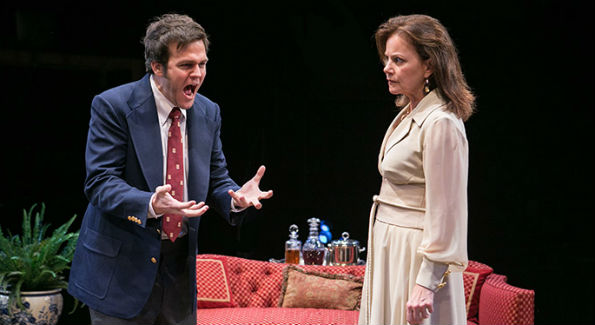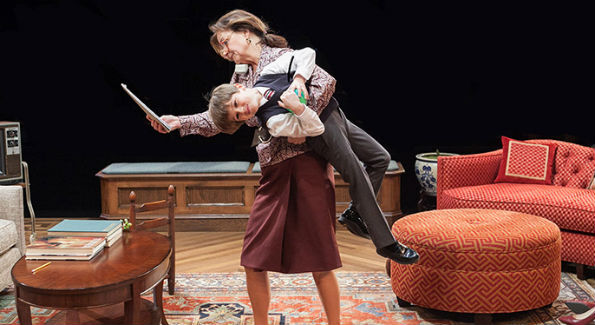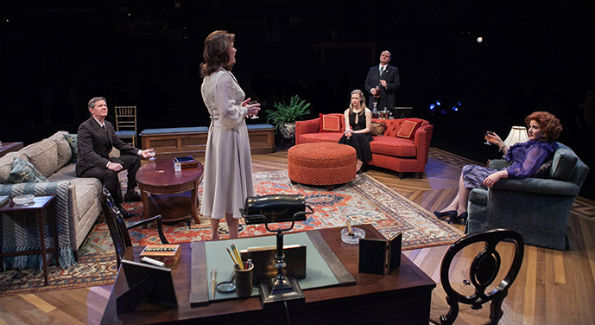The life of a Georgetown hostess and her family takes center stage in this Arena Stage production.

Michael Simpson as Colin Ferris and Margaret Colin as Hester Ferris in The City of Conversation at Arena Stage at the Mead Center for American Theater January 29-March 6, 2016 (Photo by C. Stanley Photography)
One evening during the Reagan Administration I was attending a Georgetown cocktail party and was talking to a wealthy socialite I knew. She oddly began talking about a budget debate in the Senate. I listened politely. She stopped and said, “Do I sound knowledgeable?”
Before I could respond, she smiled conspiratorially and said she had spent much of the day being tutored on a budget debate in the Senate and wanted to be prepared and look knowledgeable if the subject came up.
The beginning of the end for the legendary Georgetown salons essentially was the Kennedy/Johnson years. Arena Stage’s production of “The City of Conversation” is about one hostess who spanned more than 30 years and six presidents, a time when some political decisions actually were influenced in a few elegant Georgetown homes.
The smartly staged “The City of Conversation” begins with the voice of President Jimmy Carter arguing that judges should resign from private clubs that discriminate against minority groups. The scene opens onto the tasteful Georgetown living room of Hester Ferris, a set designed by John Lee Beatty, who understands that the true Georgetown hostess would not have an ostentatiously appointed house.
Hester is a Washington veteran who has hosted some of the city’s power brokers, and revels in her influence. Margaret Colin, under Doug Hughes sensitive direction, defines Hester as a woman with elegance, a cutting wit and a touch of arrogance. Hester is formidable. She has been influential for a long time and plans in using her well-honed connections in finding a political staff position for her son who has just completed his studies at the London School of Economics.

Margaret Colin as Hester Ferris and Tyler Smallwood as Young Ethan in The City of Conversation at Arena Stage at the Mead Center for American Theater January 29-March 6, 2016 (Photo by C. Stanley Photography)
Her son, Colin (Michael Simpson), arrives on the day of a dinner party she is hosting for a Kentucky senator and his wife. With Colin is a long-legged, tall blonde he met at the London School. Hester, a liberal Democrat, is meeting the blonde, Anna, for the first time and there is an immediate antipathy between the two. Anna, Caroline Hewitt, resembles an Ann Coulter with that conservative blonde’s political bent, but not as outrageous. Anna is a completely committed Reagan supporter and she has influenced Colin to her way of thinking.
Hester is one canny lady and immediately perceives Anna’s cutthroat ambitions. Anna says she wants to learn from Hester and asks if she can watch her prepare for the evening’s dinner party. Hester responds sharply, “I think I saw that movie.” When Anna looks puzzled, she says, “All About Eve,” a Bette Davis film classic about a fawning unscrupulous theater understudy.
“The City of Conversation” is divided into three parts. The second opens with a speech from Senator Ted Kennedy. The time period has moved from the dawn of the Reagan era to Kennedy’s potential run for the presidency and the bitter battle over the eventual defeat of the Supreme Court nomination of Robert Bork.
It is here where the family schism becomes destructive.
Anna is now working in the Justice Department with a bright future and is committed to Bork’s confirmation, while Hester, still with formidable connections, is opposing him. Anna uses her six-year-old son, who Hester dotes on, as a pawn demanding that Hester will not see him anymore if she helps defeat Bork. She argues that Hester’s actions will also hinder Colin’s stalled career.
That kind of internal family conflict can and has caused schisms in Washington families. Written by Anthony Giardina, “The City of Conversation” is literate with some clever lines, mostly written for Hester.
The play has a resemblance to Jon Robert Baitz’s “Other Desert City” that was also recently at Arena. It was about a conservative Republican, wealthy father in Palm Desert, Calif., and is a better play than “The City of Conversation.
”

(L-R) Tom Wiggin as Chandler Harris, Margaret Colin as Hester Ferris, Caroline Hewitt as Anna Fitzgerald, Todd Scofield as George Mallonee and Jjana Valentiner as Carolyn Mallonee in The City of Conversation at Arena Stage at the Mead Center for American Theater January 29-March 6, 2016 (Photo by C. Stanley Photography)
The voice of President Obama opens the third and final phase of the play. Hester, much older now, has never given up the good fight. She is a committed liberal until the end, but she knows the Georgetown influence has ended.
Pamela Harriman may have been the last of the influential hostesses.
She headed up a political action group and was credited with helping elect Bill Clinton, and was rewarded when he named her the U.S. Ambassador to Paris. Harriman was tutored and prepared for the assignment and her Senate confirmation hearing.
Another important player was Post Chairman Katharine Graham, who lived in Georgetown and hosted some of the most significant dinners. She, however, was much more than a social hostess. She was an important political force, as powerful as any congressman, cabinet member, or even a president.
Georgetown is now mostly a neighborhood of expensive, elegant houses.
It’s a nice place to live, if you can afford it, but it isn’t where presidents, congressmen and cabinet members go to discuss and decide legislation over bourbon and cigars.
In fact, many congressmen don’t even move their families to Washington and try to return home on weekends to raise money and perpetually campaign for reelection. In fact, most Republicans and Democrats don’t like each other enough to attend a dinner party in Georgetown or anywhere else. And, there are no hostesses like Hester, or the sincere woman during the Reagan Administration who prepared for a dinner in her home by being tutored to be timely and look smart about debates on the Hill.
“The City of Conversation” is, for some, a nostalgic look at when the financially privileged had too much influence.




